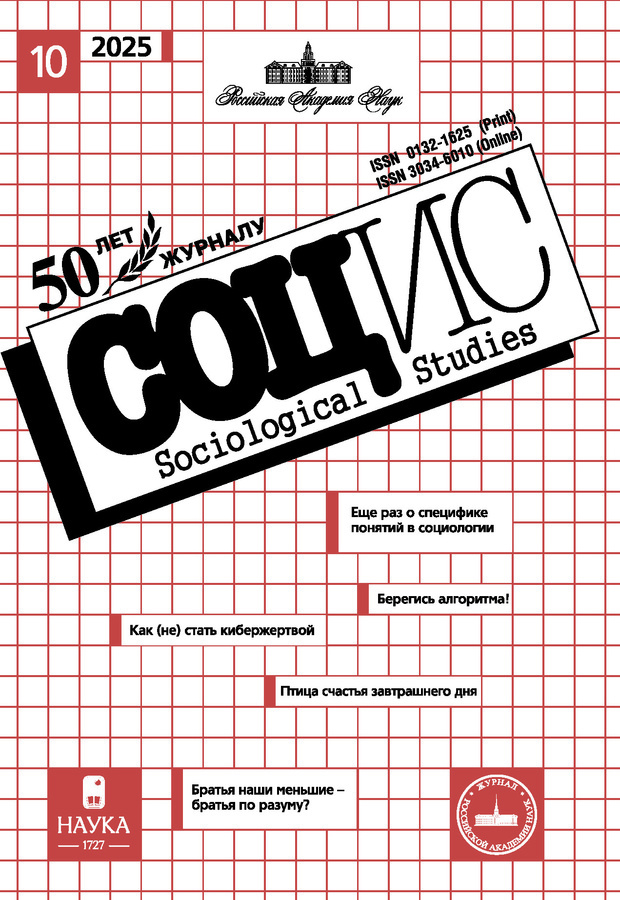GENERATIONAL SCENARIOS OF DELAYED HAPPINESS
- Autores: ABRAMOVA S.B.1, ANTONOVA N.L.1
-
Afiliações:
- Ural Federal University
- Edição: Nº 10 (2025)
- Páginas: 131-146
- Seção: DISCISSION. POLEMICS
- URL: https://rjsocmed.com/0132-1625/article/view/696520
- DOI: https://doi.org/10.31857/S0132162525100119
- ID: 696520
Citar
Texto integral
Resumo
The article, based on survey data (n = 1170), determined that the emotional mood of the population includes scenarios according to which happiness is postponed indefinitely. The results of the study indicate a decrease in the severity of scenarios of delayed happiness with age. For respondents aged 18–24, the dominant scenarios are those related to personal development, gaining independence, and professional and work-related fulfillment. Among respondents aged 25–45, there is a shift in focus towards social status and material stability. Respondents aged 46–60 are more often focused on achieving stability and completion in life scenarios. Barriers to achieving happiness are uncertainty and self-prohibitions. The focus on increasing happiness through achieving goals in the future unites respondents of different age groups, but the content of goals differs depending on the value-meaning life perspective.
Palavras-chave
Sobre autores
S. ABRAMOVA
Ural Federal University
Autor responsável pela correspondência
Email: s.b.abramova@urfu.ru
Yekaterinburg, Russia
N. ANTONOVA
Ural Federal University
Email: n.l.antonova@urfu.ru
Yekaterinburg, Russia
Bibliografia
- Альперович В. Д. Жизненные сценарии и биографические нарративы: сравнительный анализ концептуальных моделей // Социальная психология и общество. 2024. Т. 15. № 1. С. 39–56. doi: 10.17759/sps.2024150103.
- Андреенкова А. В. Нормативность представлений о возрастных границах основных жизненных этапов // Мониторинг общественного мнения: экономические и социальные перемены. 2025. № 1. С. 3–28. doi: 10.14515/monitoring.2025.1.2685.
- Антонова Н. Л., Абрамова С. Б. Право на город: мотивация социальной активности городской молодежи // Теория и практика общественного развития. 2021. № 6(160). С. 15–19. doi: 10.24158/tipor.2021.6.1.
- Дидковская Я. В., Трынов Д. В., Чистяков П. А. Профессиональные стратегии студентов в контексте образа социального будущего // Социологические исследования. 2023. № 9. С. 63–77. doi: 10.31857/S013216250027778-8.
- Козырева П. М., Смирнов А. И. Счастье осмысленное и спонтанное // Социологическая наука и социальная практика. 2017. Т. 5. № 4. С. 65–91. doi: 10.19181/snsp.2017.5.4.5520.
- Костылева Ю. А., Серкин В. П. Феноменология сценария и невроза отложенной жизни у линейных менеджеров // Организационная психология. 2022. Т. 12. № 1. С. 201–227. doi: 10.17323/2312-5942-2022-12-1-201-227.
- Леонтьев Д. А. Счастье и субъективное благополучие: к конструированию понятийного поля // Мониторинг общественного мнения: экономические и социальные перемены. 2020. № 1. С. 14–37. doi: 10.14515/monitoring.2020.1.02.
- Оюунсурэн Ж., Ермолаев В. В. Счастливая семья: кросс-культурный анализ представлений российской и монгольской молодежи // Вестник Кемеровского государственного университета. 2019. Т. 21. № 4. С. 989–997. doi: 10.21603/2078-8975-2019-21-4-989-997.
- Пищик В. И. Сценарии жизни и социальные аксиомы представителей «Информационного» и «Нового» поколений // Герценовские чтения: психологические исследования в образовании. 2021. Вып. 4. С. 501–506. doi: 10.33910/herzenpsyconf-2021-4-62.
- Рикель А. М., Дорохов Е. А. Поколение как предмет социальной психологии: исследовать нельзя отказаться? // Вестник Московского ун-та. Сер. 14. Психология. 2023. Т. 46. № 3. С. 143–165. doi: 10.11621/LPJ-23–31.
- Савельева О. О., Капустина А. С. Социальное конструирование эмоции «счастье» в рекламе // Вестник Санкт-Петербургского ун-та. Социология. 2016. № 4. С. 53–68. doi: 10.21638/11701/spbu12.2016.404.
- Слободчиков В. И. Психология становления и развития человека в образовании (доклад) // Вестник Санкт-Петербургского ун-та. Психология. Педагогика. 2016. № 1. С. 100–108.
- Троцук И. В., Королева К И. Субъективное благополучие – качество жизни или счастье? // Гуманитарные, социально-экономические и общественные науки. 2020. № 9. С. 57–62. doi: 10.23672/w3129-9969-0189-t.
- Черныш М. Ф. Факторы, влияющие на переживание счастья в российском обществе // Социологическая наука и социальная практика. 2019. № 7(2). С. 9–33. doi: 10.19181/snsp.2019.7.2.6407.
- Berntsen D., Rubin D. C. Cultural life scripts structure recall from autobiographical memory // Memory & Cognition. 2004. Vol. 32. P. 427–442. doi: 10.3758/bf03195836.
- Catalino L. I., Algoe S. B., Fredrickson B. L. Prioritizing positivity: An effective approach to pursuing happiness? // Emotion. 2014. No. 14. P. 1155–1161. doi: 10.1037/a0038029.
- Dfarhud D., Malmir M., Khanahmadi M. Happiness & Health: The Biological Factors – Systematic Review Article // Iran J Public Health. 2014. Vol. 43. No. 11. P. 1468–1477.
- Diener E., Seligman MEP. Very happy people // Psychological Science. 2002. No. 13. P. 81–84. doi: 10.1111/1467–9280.00415.
- Diener E., Lucas R. E., Scollon C. N. Beyond the Hedonic Treadmill Revising the Adaptation Theory of Well-Being // American Psychologist. 2006. Vol. 61. P. 305–314. doi: 10.1037/0003-066X.61.4.305.
- Fisher C. D. Happiness at Work // IJMR. 2010. Vol. 12. № 4. P. 384–41. doi: 10.1111/j.1468-2370.2009.00270.x.
- Gardiner G., Sauerberger K. et al. What happy people do: The behavioral correlates of happiness in everyday situations // Journal of Research in Personality. 2022. No. 99. P. 1–5. doi: 10.1016/j.jrp.2022.104236.
- Krasko J., Intelisano S., Luhmann M. The complexity of the pursuit of happiness is associated with the success of well-being related behaviors in everyday life // European Journal of Personality. 2023. Vol. 38. No. 5. P. 793–811. doi: 10.1177/08902070231220970.
- Makki N., Mohanty M. S. Mental Health and Happiness: Evidence From the U. S. Data // The American Economist. 2019. Vol. 64. No. 2. P. 197–215. doi: 10.1177/0569434518822266.
- Mendes M., Simões P. A. et al. The link between happiness and health: a review of concepts, pathways and strategies for enhancing well-being // Fam Med Prim Care Rev. 2023. Vol. 25. No. 3. P. 288–296. doi: 10.5114/fmpcr.2023.130090.
- Robinson O. C. Values and adult age: findings from two cohorts of the European Social Survey // European Journal of Ageing. 2013. Vol. 10. P. 11–23. doi: 10.1007/s10433-012-0247-3.
- Song C. F., Tay P. K.C. et al. Happy people live longer because they are healthy people // BMC Geriatr 23. 2023. 440. doi: 10.1186/s12877-023-04030-w.
- Titova L., Sheldon K. M. Happiness comes from trying to make others feel good, rather than oneself // The Journal of Positive Psychology. 2021. Vol. 17. No. 3. P. 341–355. doi: 10.1080/17439760.2021.1897867.
- Veenhoven R. Sociology’s blind eye for happiness // Comparative Sociology. 2014. No. 13. P. 537–555. DOI: 101163/15691330-123411324.
Arquivos suplementares










